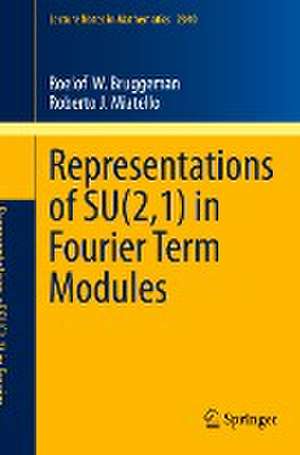Representations of SU(2,1) in Fourier Term Modules: Lecture Notes in Mathematics, cartea 2340
Autor Roelof W. Bruggeman, Roberto J. Miatelloen Limba Engleză Paperback – 7 noi 2023
These results can be applied to prove a completeness result for Poincaré series in spaces of square integrable automorphic forms.
Aimed at researchers and graduate students interested in automorphic forms, harmonic analysis on Lie groups, and number-theoretic topics related to Poincaré series, the book will also serve as a basic reference on spectral expansion with Fourier-Jacobi coefficients. Only a background in Lie groups and their representations is assumed.
Din seria Lecture Notes in Mathematics
- 17%
 Preț: 360.42 lei
Preț: 360.42 lei -
 Preț: 459.92 lei
Preț: 459.92 lei -
 Preț: 121.41 lei
Preț: 121.41 lei -
 Preț: 175.68 lei
Preț: 175.68 lei -
 Preț: 197.00 lei
Preț: 197.00 lei -
 Preț: 279.76 lei
Preț: 279.76 lei -
 Preț: 477.65 lei
Preț: 477.65 lei - 17%
 Preț: 361.88 lei
Preț: 361.88 lei -
 Preț: 252.37 lei
Preț: 252.37 lei -
 Preț: 353.99 lei
Preț: 353.99 lei -
 Preț: 138.88 lei
Preț: 138.88 lei -
 Preț: 152.61 lei
Preț: 152.61 lei -
 Preț: 116.67 lei
Preț: 116.67 lei -
 Preț: 102.77 lei
Preț: 102.77 lei - 17%
 Preț: 365.52 lei
Preț: 365.52 lei -
 Preț: 396.75 lei
Preț: 396.75 lei - 17%
 Preț: 362.12 lei
Preț: 362.12 lei -
 Preț: 396.11 lei
Preț: 396.11 lei -
 Preț: 357.78 lei
Preț: 357.78 lei - 17%
 Preț: 362.31 lei
Preț: 362.31 lei -
 Preț: 403.80 lei
Preț: 403.80 lei - 17%
 Preț: 361.70 lei
Preț: 361.70 lei -
 Preț: 499.87 lei
Preț: 499.87 lei -
 Preț: 457.03 lei
Preț: 457.03 lei -
 Preț: 395.90 lei
Preț: 395.90 lei -
 Preț: 459.00 lei
Preț: 459.00 lei -
 Preț: 487.57 lei
Preț: 487.57 lei -
 Preț: 424.01 lei
Preț: 424.01 lei -
 Preț: 487.57 lei
Preț: 487.57 lei -
 Preț: 330.55 lei
Preț: 330.55 lei -
 Preț: 325.75 lei
Preț: 325.75 lei -
 Preț: 350.30 lei
Preț: 350.30 lei -
 Preț: 331.31 lei
Preț: 331.31 lei -
 Preț: 408.37 lei
Preț: 408.37 lei -
 Preț: 328.25 lei
Preț: 328.25 lei -
 Preț: 421.28 lei
Preț: 421.28 lei -
 Preț: 276.08 lei
Preț: 276.08 lei -
 Preț: 424.60 lei
Preț: 424.60 lei -
 Preț: 422.05 lei
Preț: 422.05 lei -
 Preț: 505.01 lei
Preț: 505.01 lei -
 Preț: 422.05 lei
Preț: 422.05 lei -
 Preț: 274.93 lei
Preț: 274.93 lei -
 Preț: 335.16 lei
Preț: 335.16 lei -
 Preț: 422.27 lei
Preț: 422.27 lei -
 Preț: 497.49 lei
Preț: 497.49 lei -
 Preț: 272.81 lei
Preț: 272.81 lei -
 Preț: 428.04 lei
Preț: 428.04 lei -
 Preț: 376.22 lei
Preț: 376.22 lei -
 Preț: 427.10 lei
Preț: 427.10 lei -
 Preț: 325.92 lei
Preț: 325.92 lei
Preț: 399.85 lei
Nou
Puncte Express: 600
Preț estimativ în valută:
76.52€ • 79.43$ • 63.81£
76.52€ • 79.43$ • 63.81£
Carte tipărită la comandă
Livrare economică 18-24 martie
Preluare comenzi: 021 569.72.76
Specificații
ISBN-13: 9783031431913
ISBN-10: 303143191X
Pagini: 210
Ilustrații: XI, 210 p. 66 illus., 51 illus. in color.
Dimensiuni: 155 x 235 mm
Greutate: 0.39 kg
Ediția:1st ed. 2023
Editura: Springer Nature Switzerland
Colecția Springer
Seria Lecture Notes in Mathematics
Locul publicării:Cham, Switzerland
ISBN-10: 303143191X
Pagini: 210
Ilustrații: XI, 210 p. 66 illus., 51 illus. in color.
Dimensiuni: 155 x 235 mm
Greutate: 0.39 kg
Ediția:1st ed. 2023
Editura: Springer Nature Switzerland
Colecția Springer
Seria Lecture Notes in Mathematics
Locul publicării:Cham, Switzerland
Cuprins
- 1. Introduction. - 2. The Lie Group SU(2,1) and Subgroups. - 3. Fourier Term Modules. - 4. Submodule Structure. - 5. Application to Automorphic Forms.
Notă biografică
Roelof W. Bruggeman was born in Zwolle, the Netherlands. He obtained his PhD at Utrecht University in 1972, and was a postdoctoral fellow at Yale University (1972–73). He has worked at Utrecht University since 1980, now as a guest after his retirement in 2005. In 2022 he became a corresponding member of the Academia Nacional de Ciencias in Córdoba, Argentina. The main research themes in his work are the spectral theory of Maass forms, the study of families of automorphic forms as a function of complex parameters, and the relation between automorphic forms and cohomology.
Roberto J. Miatello was born in Buenos Aires, Argentina. After studying at FaMAF, UNCordoba, Argentina (1965–1970) he obtained his PhD from Rutgers University in 1976. He was a professor at UFPe, Brazil (1977-1980), a member of the IAS, Princeton, USA (1980-81), and has been a professor at FaMAF (UNC) since 1982, becoming Professor Emeritus in 2016. He is a member of Conicet and (since 1996) the National Academy of Sciences of Argentina. His research focuses on geometry, the spectral theory of locally symmetric varieties, and automorphic forms.
Textul de pe ultima copertă
This book studies the modules arising in Fourier expansions of automorphic forms, namely Fourier term modules on SU(2,1), the smallest rank one Lie group with a non-abelian unipotent subgroup. It considers the “abelian” Fourier term modules connected to characters of the maximal unipotent subgroups of SU(2,1), and also the “non-abelian” modules, described via theta functions. A complete description of the submodule structure of all Fourier term modules is given, with a discussion of the consequences for Fourier expansions of automorphic forms, automorphic forms with exponential growth included.
These results can be applied to prove a completeness result for Poincaré series in spaces of square integrable automorphic forms.
Aimed at researchers and graduate students interested in automorphic forms, harmonic analysis on Lie groups, and number-theoretic topics related to Poincaré series, the book will also serve asa basic reference on spectral expansion with Fourier-Jacobi coefficients. Only a background in Lie groups and their representations is assumed.
Caracteristici
Describes the structure of Fourier term modules Gives complete Fourier-Jacobi expansions for SU(2,1) Provides computations in the Mathematica notebook
